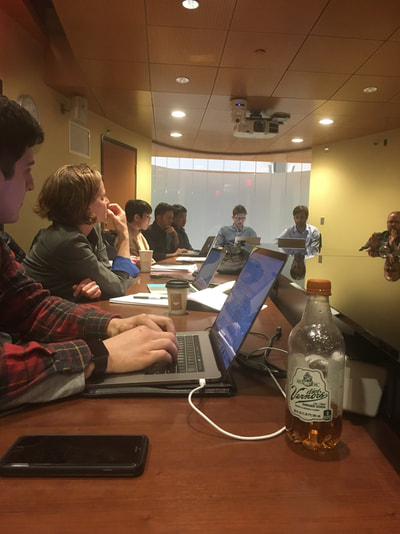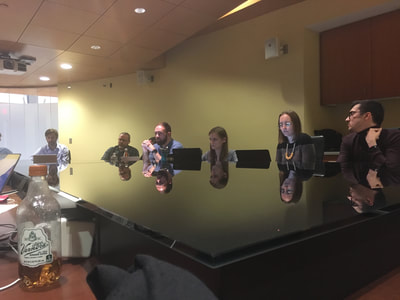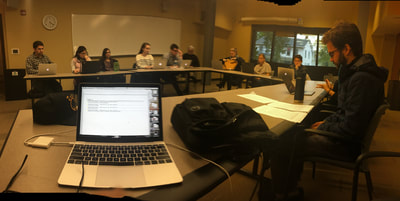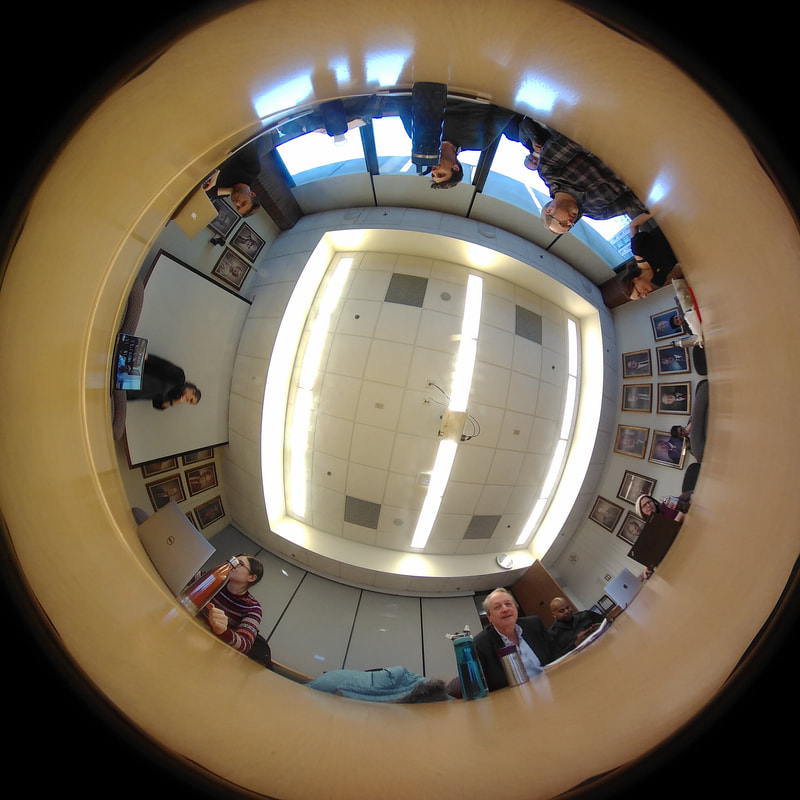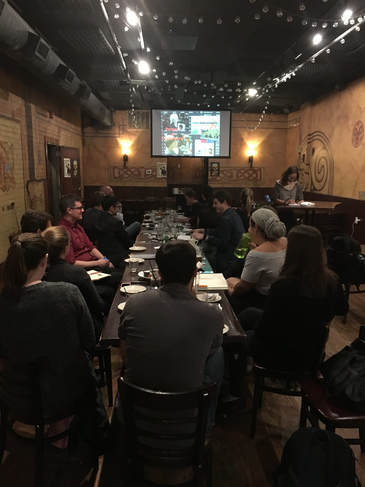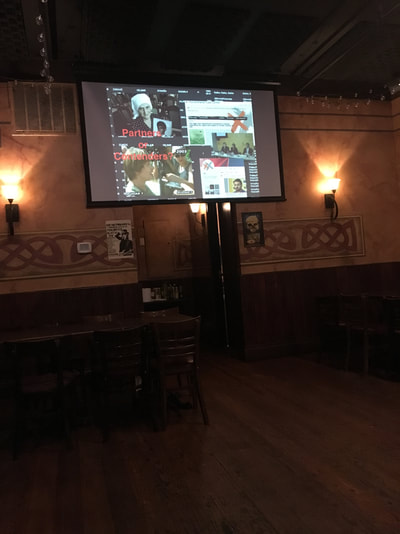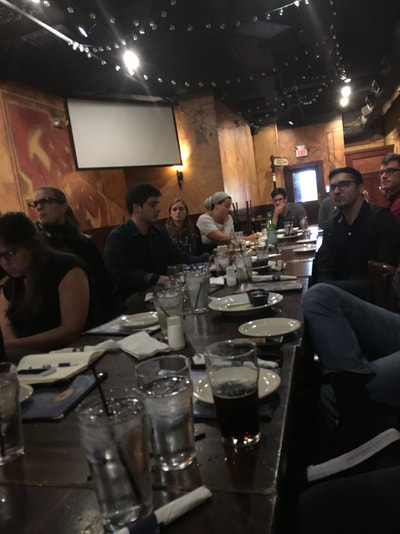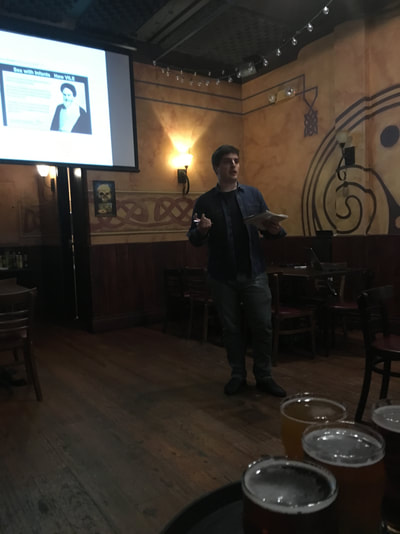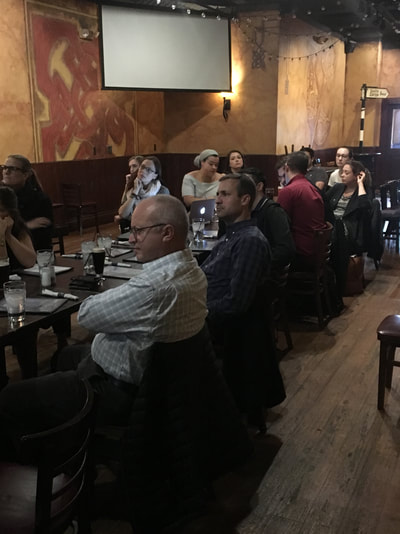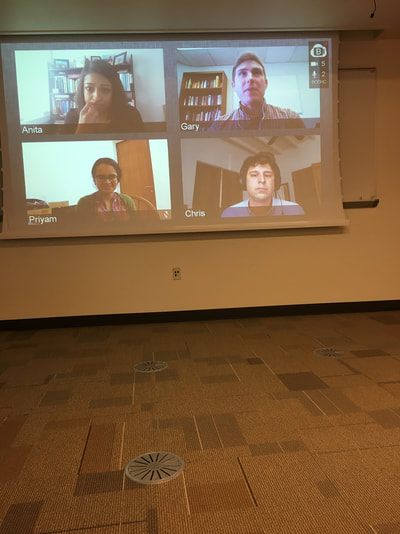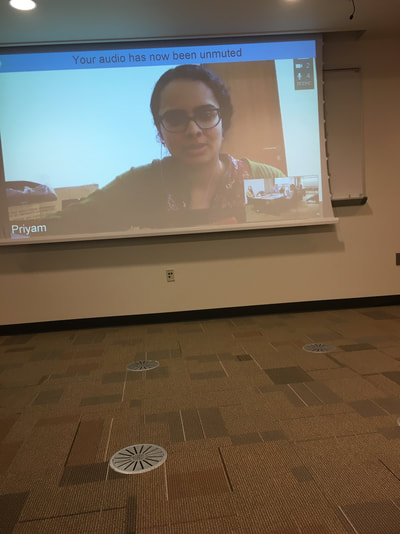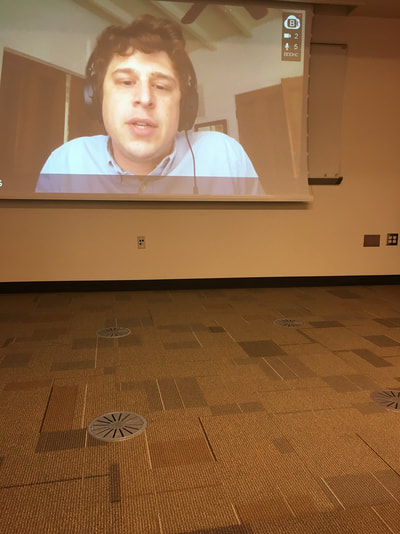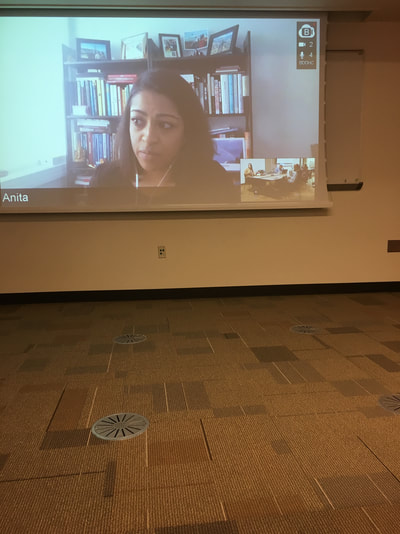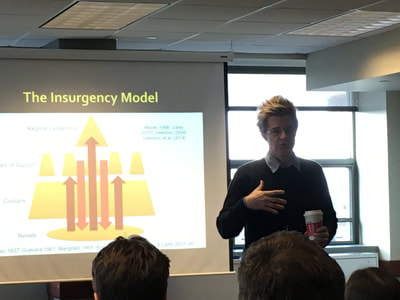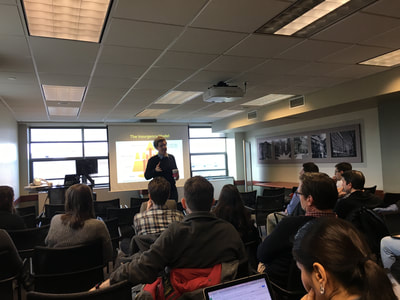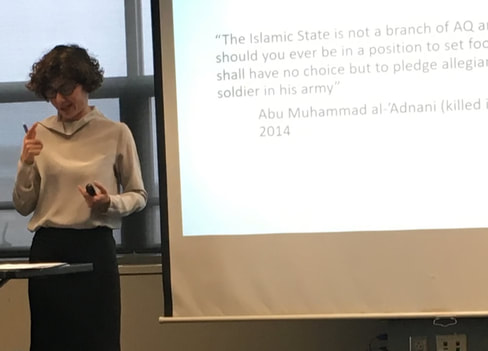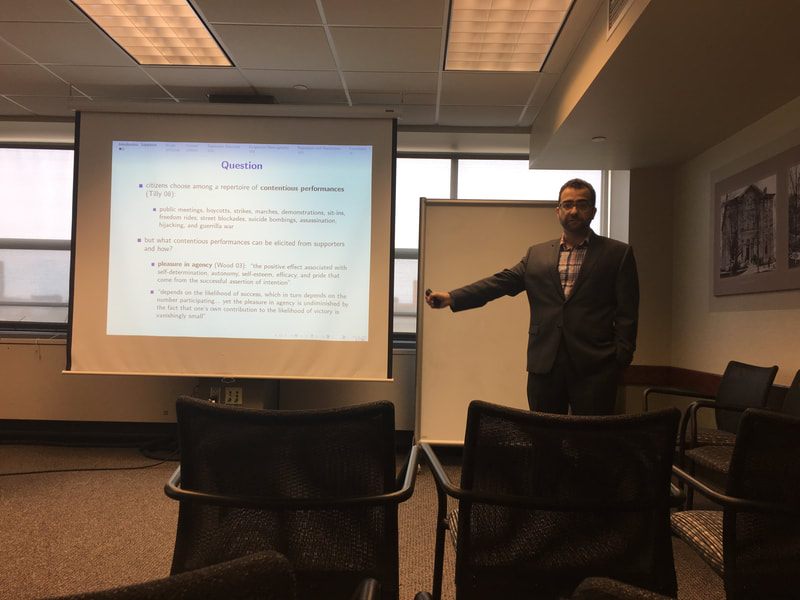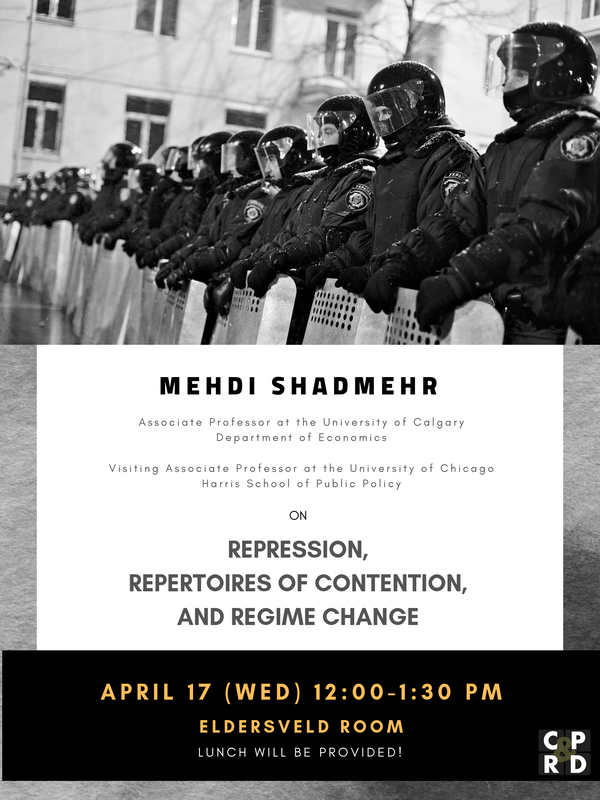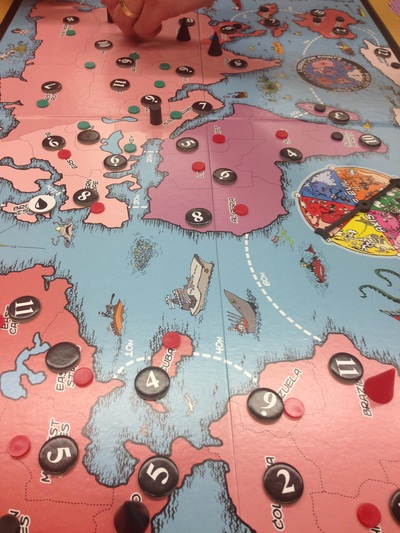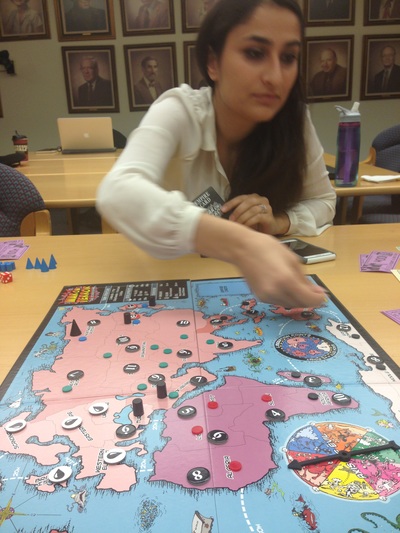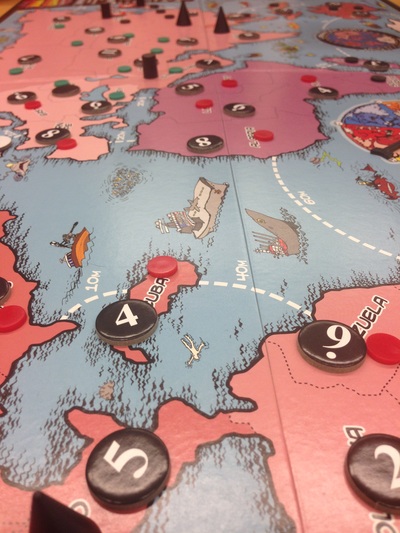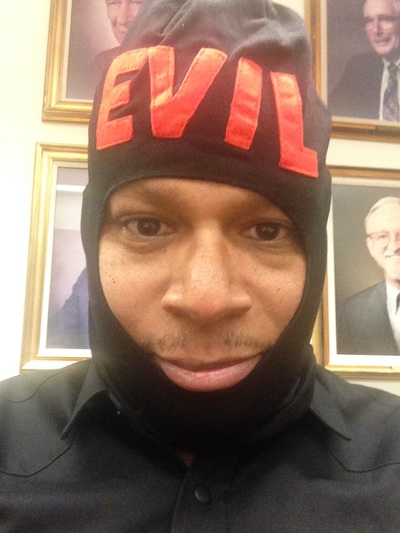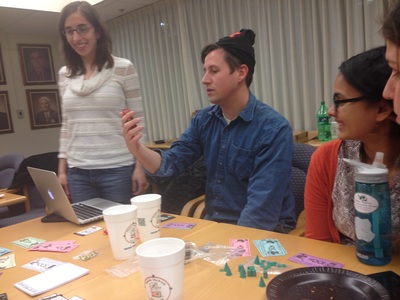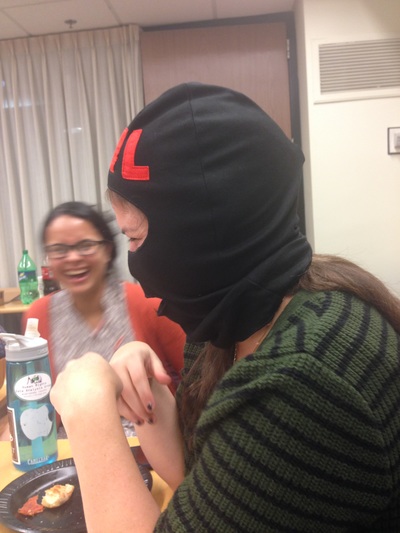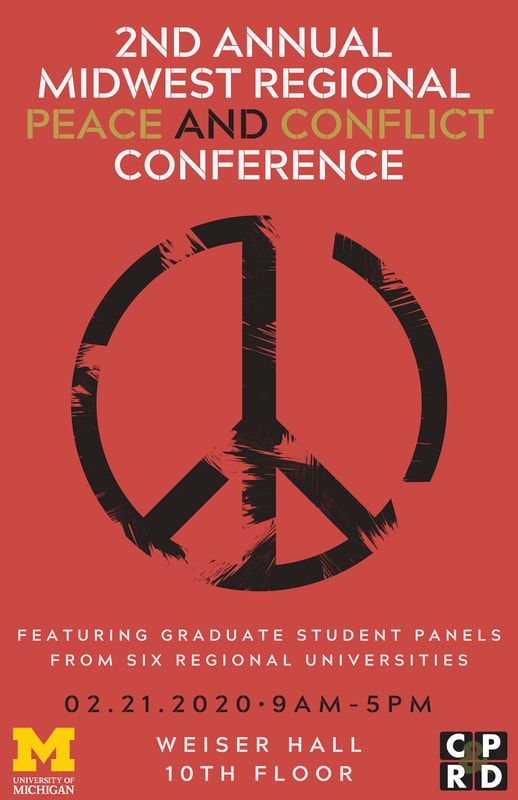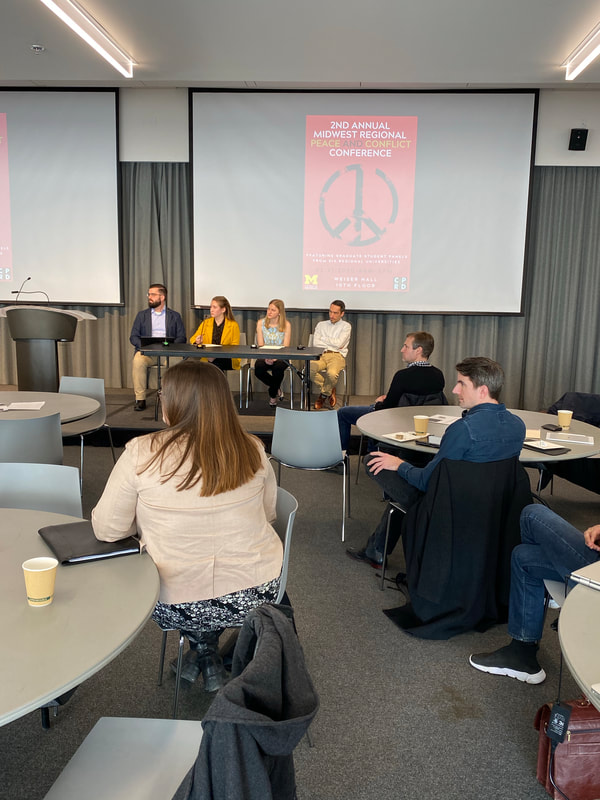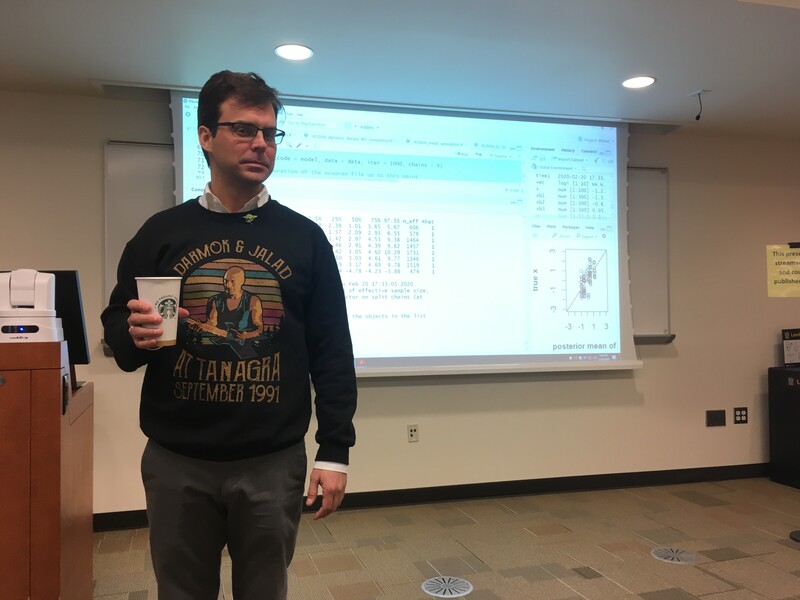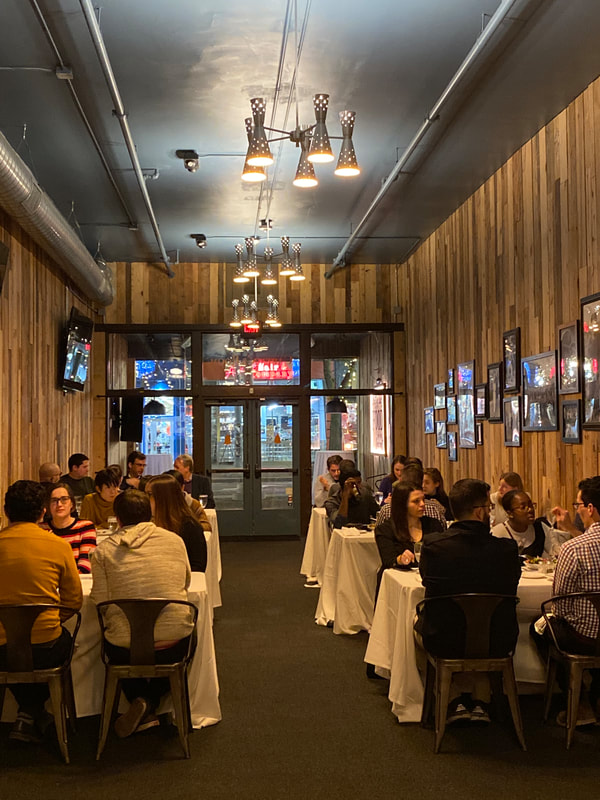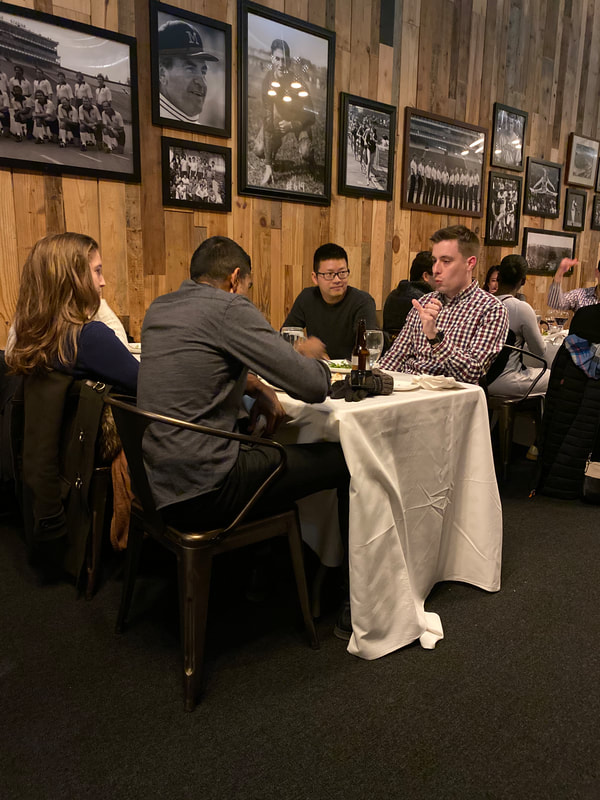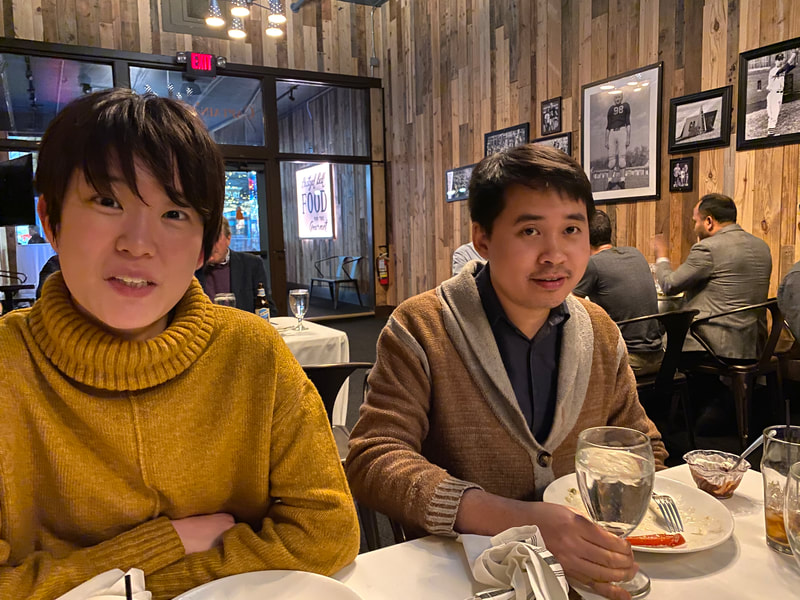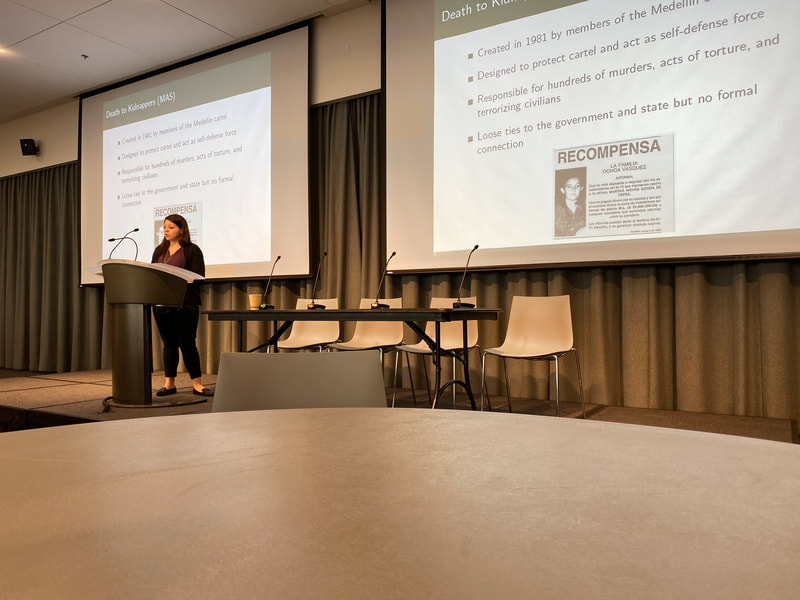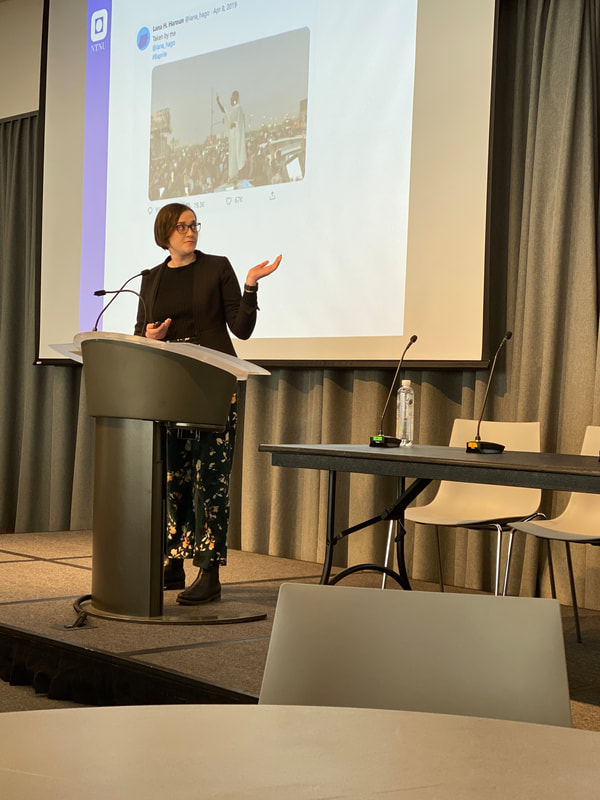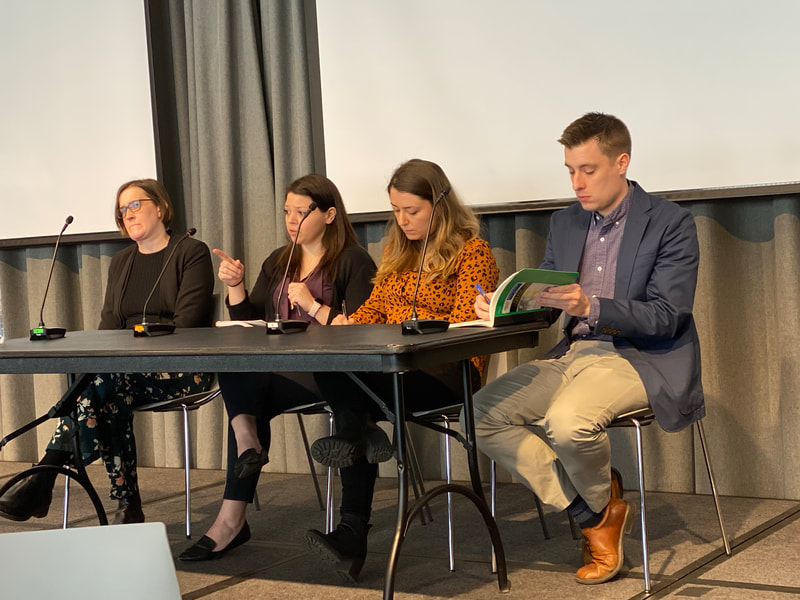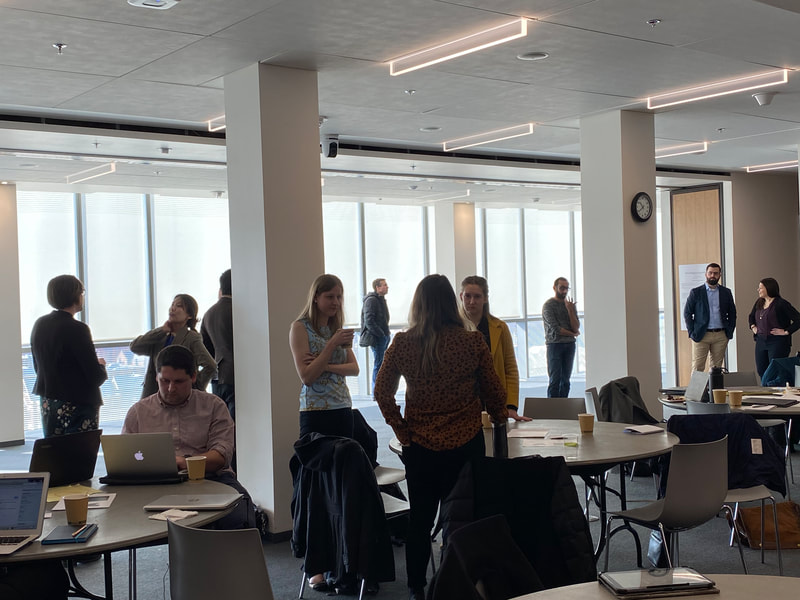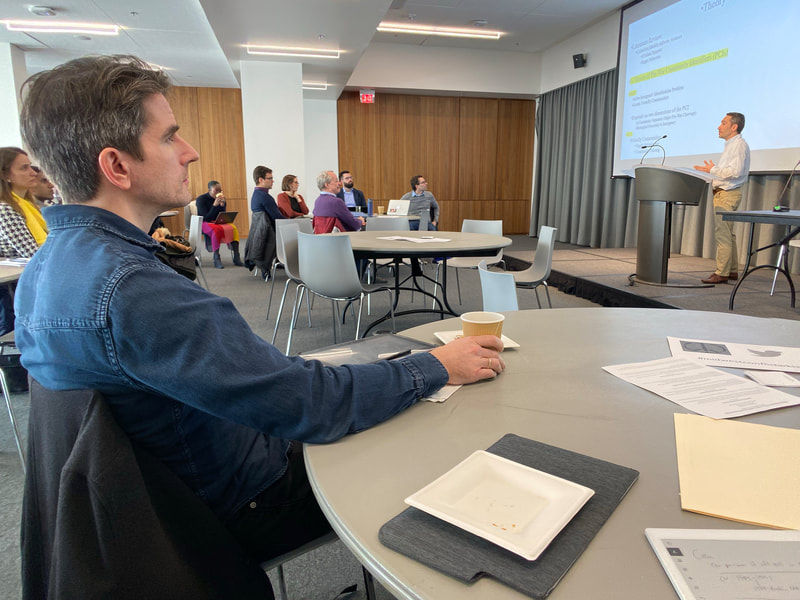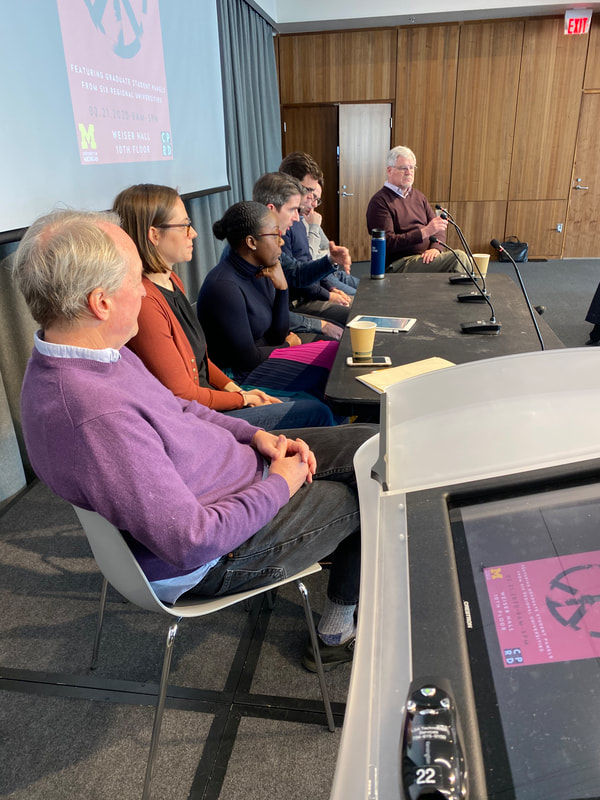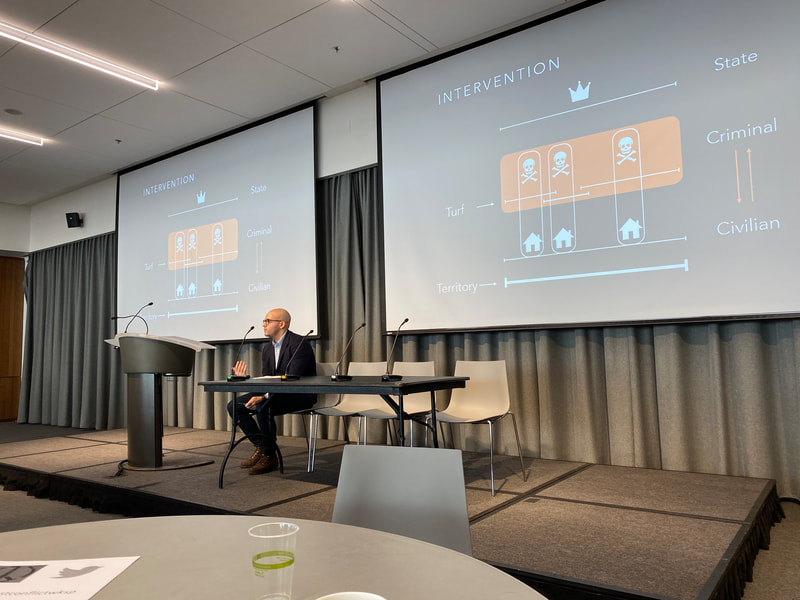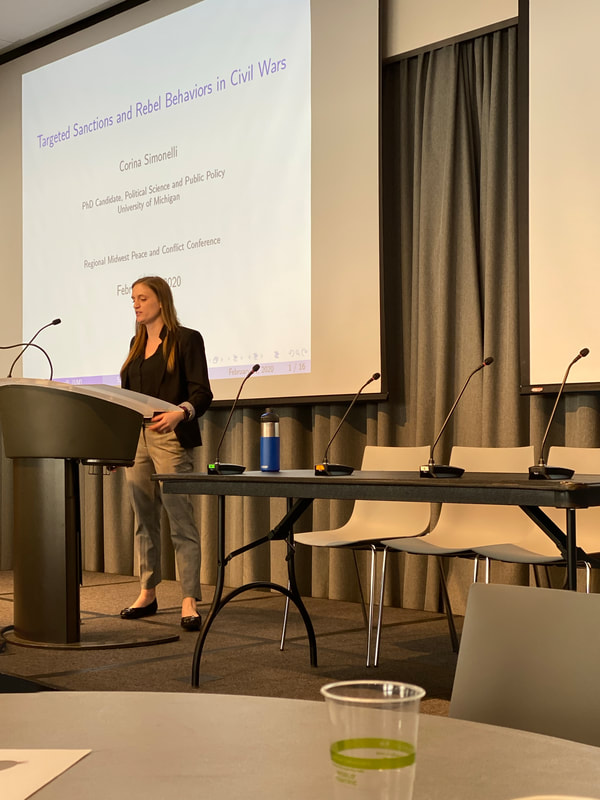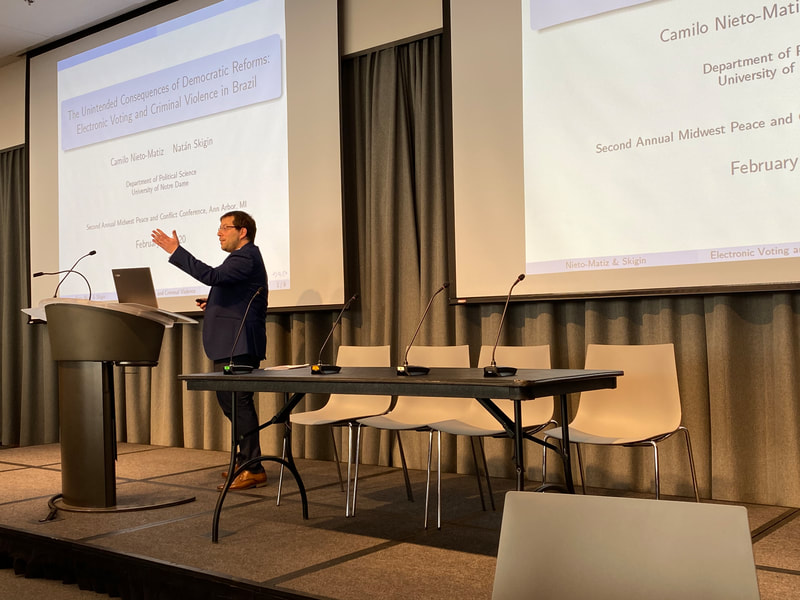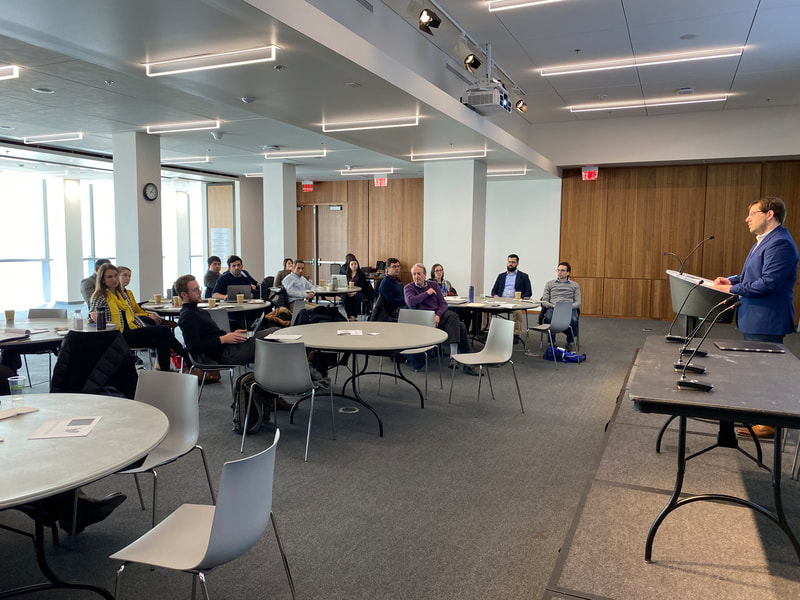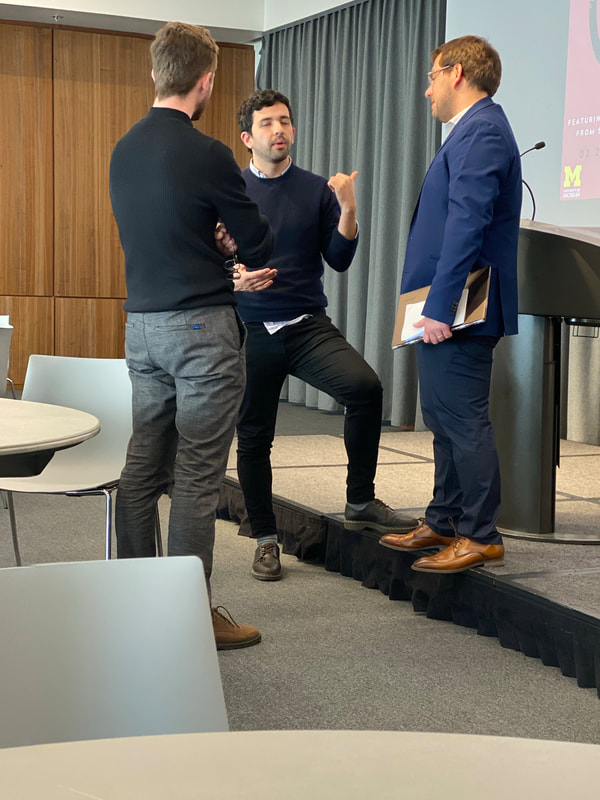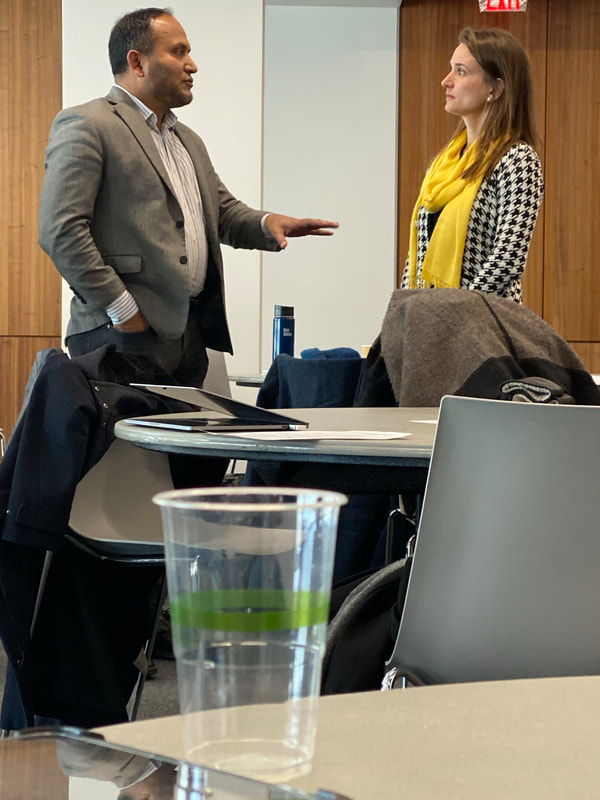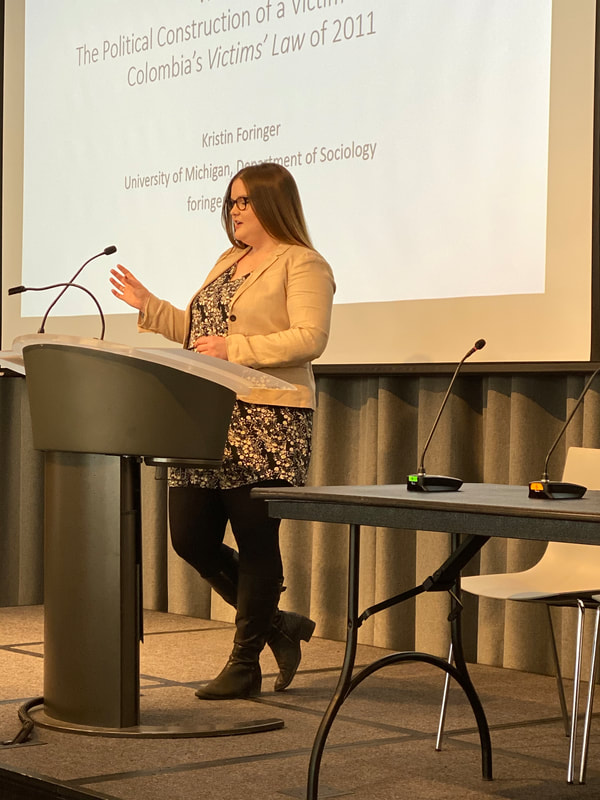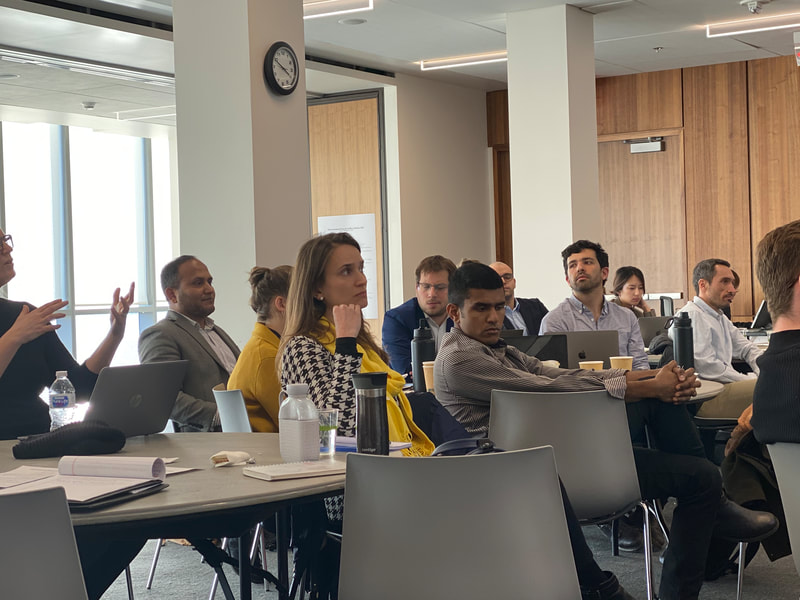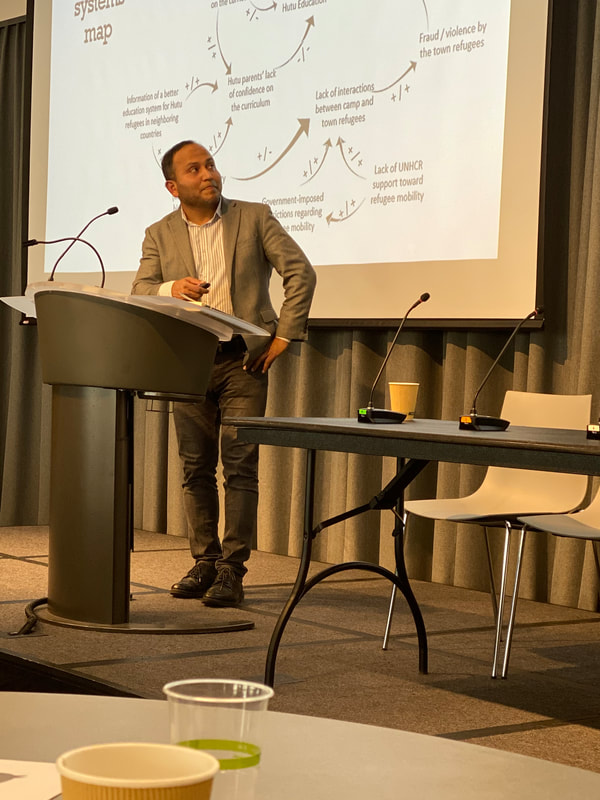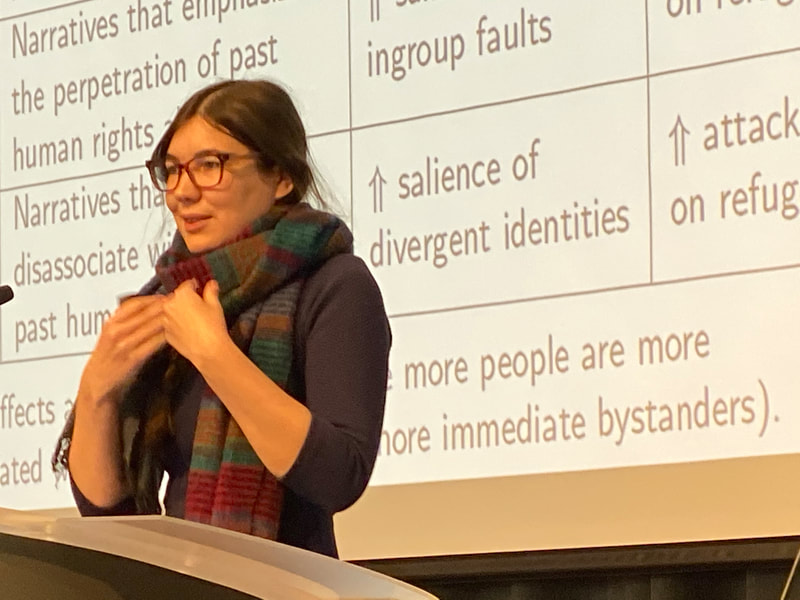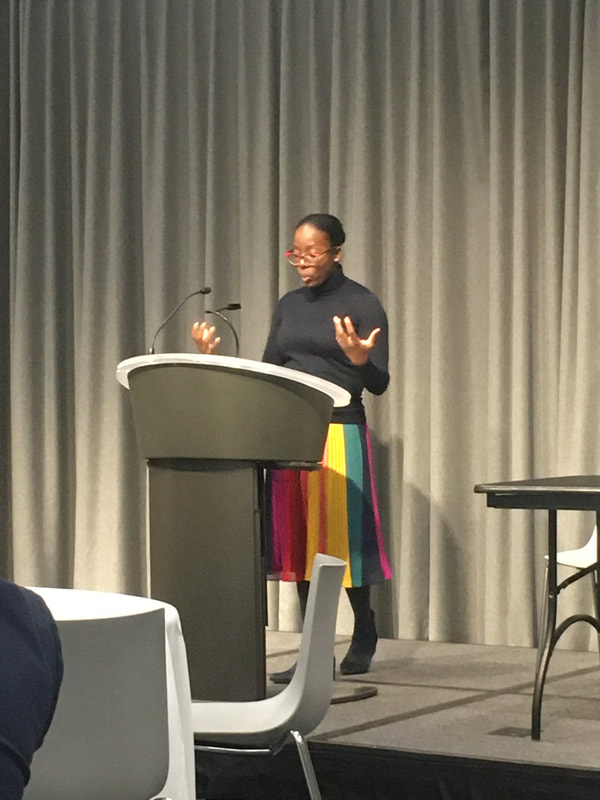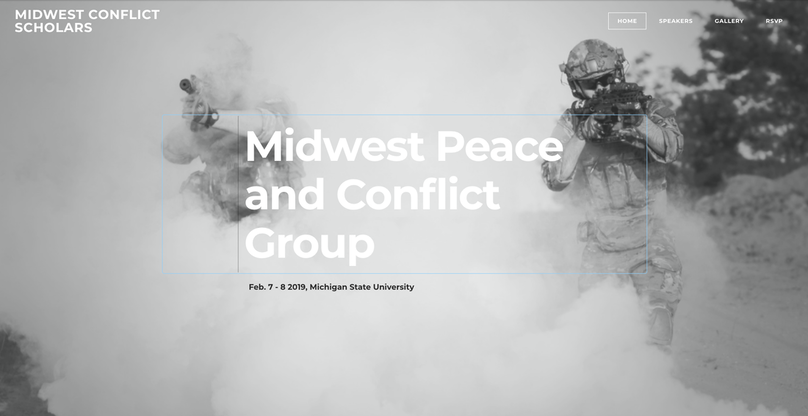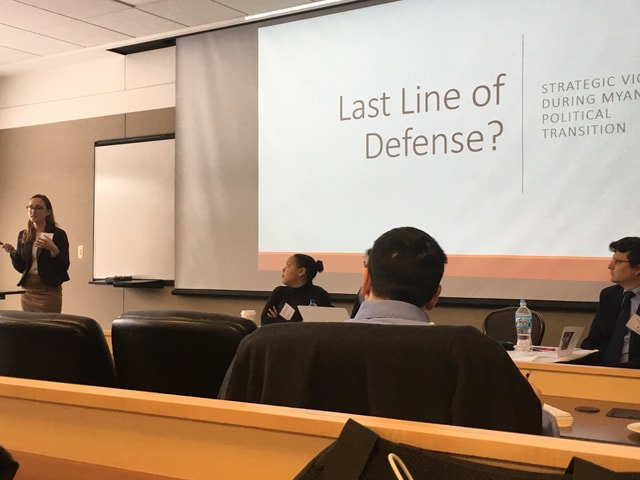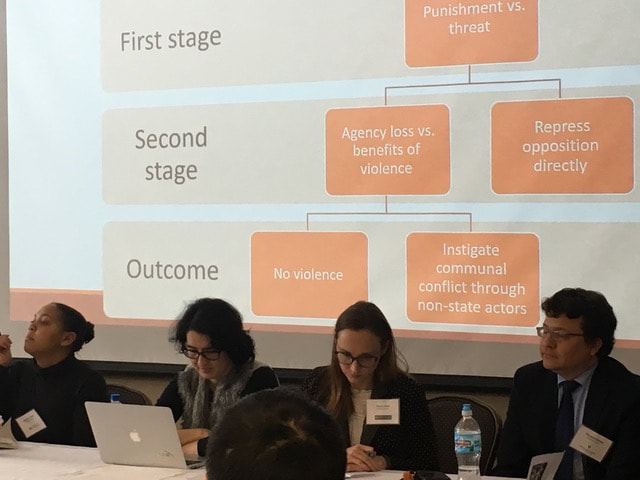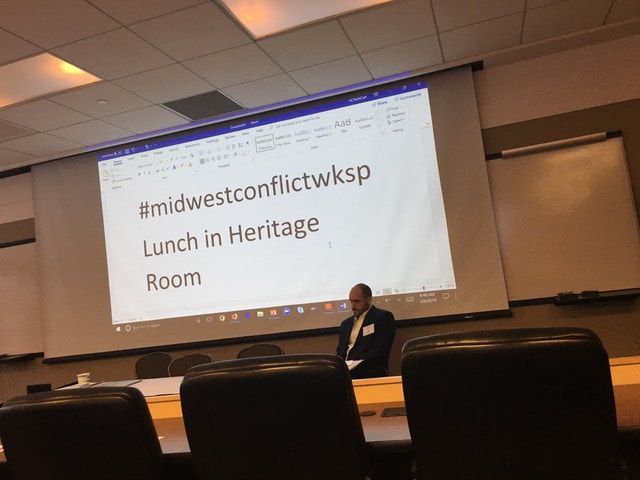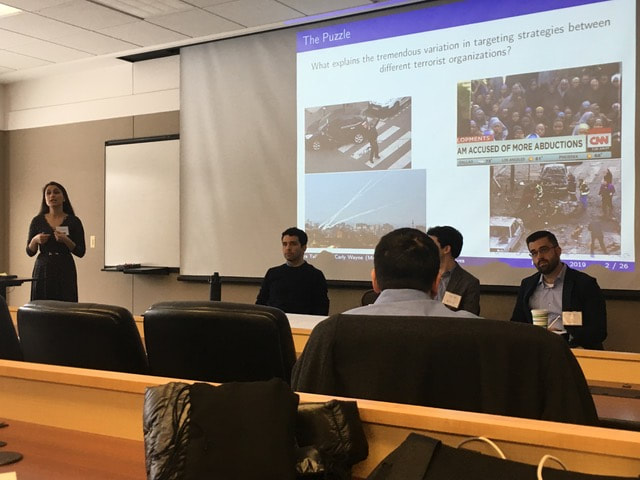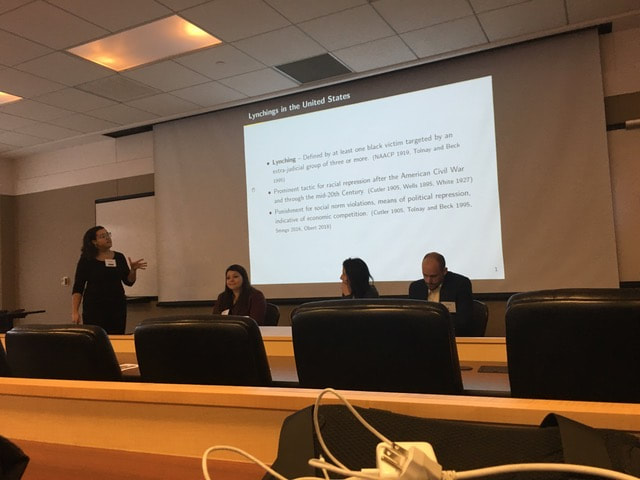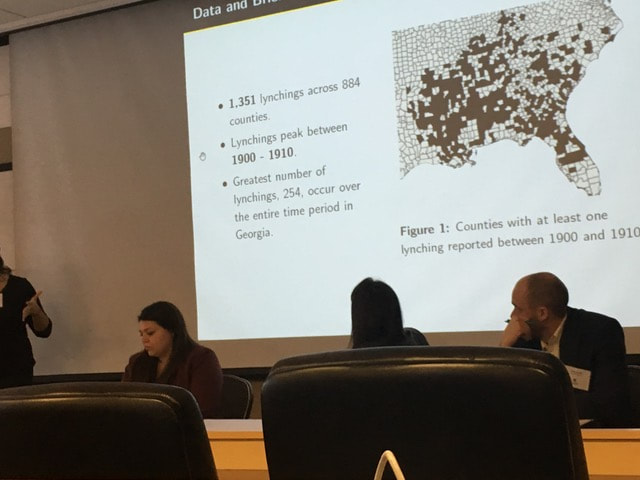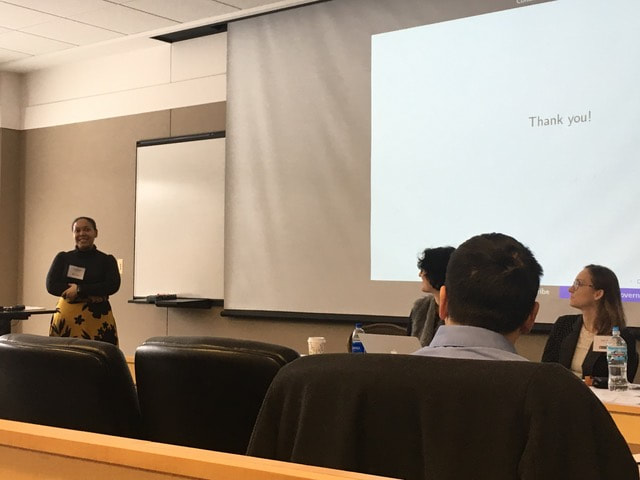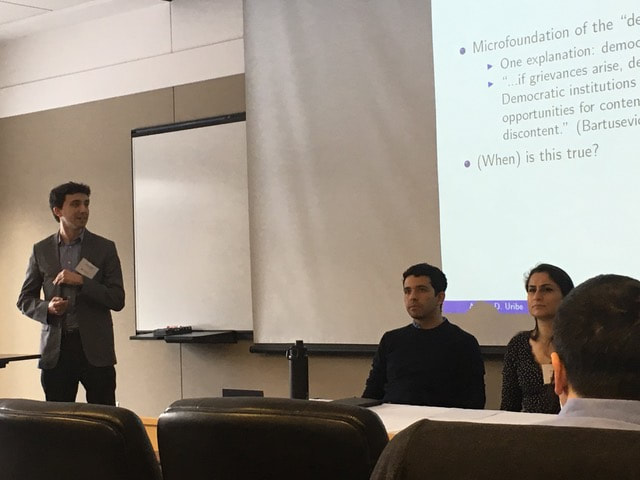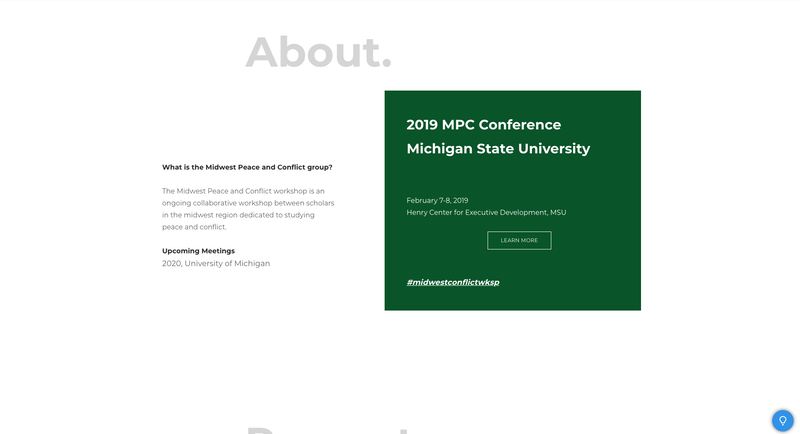Activities
Regular Monthly ActivitiesCPRD Workshop |
Charles Tilly’s Rules of Etiquette and Process
Within this workshop (held at the University of Michigan in the Center for Political Studies), original research is put forward, comments are made and then a discussion ensues for an hour and a half regarding theory, hypotheses, method, analyses, findings are writing. Schedule (see Calendar) |
5 minute Fiesta!
|
The rules are simple:
- The goal is to quickly present (4-5 minutes) one idea with visual information in no more than 2 slides. 1-slide decks are welcome. 3 or more slides are not allowed. The title slide counts as a slide. 2 slides only! - Graphs are good. Words are bad. - The presentation can be on anything the presenter would like feedback on. 2-3 minutes for feedback so 5-7 total minutes per person-presentation. - Potential topics: a research design, a counter intuitive result, a research question worth exploring, a set of survey questions about to go into the field, a model. - You have to scream FIESTA! after everyone's presentation. |
CPRD Special Events
Seeing Like a Scott: A Week-long Residency with James Scott (April 2023)
Very few scholars have produced a volume of work where each book is a classic on its own. James Scott is one such professor. Rather than have Prof. Scott visit Michigan to give a talk, have a bite and leave, CPRD has decided to initiate a new effort where we bring in a major scholar to interact with the CPRD and Michigan community over a more extensive period of time. Over the course of a week (April 19-26, 2023), Prof. Scott will engage in public talks, participate in a retrospective panel regarding his life's work, participate in diverse informal exchanges and have a little fun. The objective is to not only discuss the work but also the process; not only the successes but also the failures. We will record as much as we can for those who will not be able to make it. More events like this will take place each year hereafter.
Other
Professional Development Sessions
CPRD has a strong interest in facilitating the training, development and employment of its graduate students. To facilitate this endeavor, we virtually convened a panel of four recent graduates to talk about their alternative paths through the CPRD and Michigan program as well as what they wish they knew when they went on the market. The session was convened by Christian Davenport and conducted by Professors Christopher Sullivan, Priyam Trivedi and Gary Uzonyi as well as Anita Ravishankar (who although not yet finished is already employed).
External Visitations
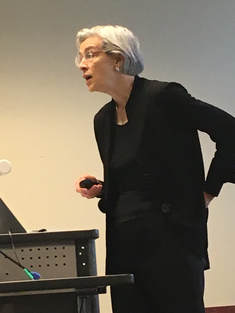
In an effort to create as vibrant a community as possible, CPRD tries to stay aware of what we do and do not have strength in. Addressing gaps or interests for our participants we bring in external visitors to stay with us a while participating in a public lecture, an interaction with the CPRD group (presenting to or serving as a discussant for the workshop) as well as participate in one or two social events with graduate students.
Professor Elisabeth Wood from Yale University (featured to the left) came two years ago to present some of her work on the repertoires of sexual violence. This work provides the theoretical underpinning for her next book.
Professor Elisabeth Wood from Yale University (featured to the left) came two years ago to present some of her work on the repertoires of sexual violence. This work provides the theoretical underpinning for her next book.
Professor Erica Chenoweth from the University of Denver (featured below) came a year ago to present some of her work on Insurgency.
Prof. Nelly Lahoud is a senior fellow in New America's International Security program. She came to talk about the evolution of the Islamic State.
Professor Mehdi Shadmehr came to present a couple of papers in 2019 concerning repertoires as well as regime change.
Research Discussions

Conflict Consortium Meetings 1 & 2. What has over four decades of scientific inquiry into the processes that produce violent political conflict taught us? Will Moore (Florida State University) and Christian Davenport (University of Michigan) have a combined four decades of experience as active members of this research community and are of the considered opinion that a good answer to this question is: far less than we should have learned. In particular, there has been far less accumulation than the effort as well as resources invested should have produced, and far less concern among those engaged in this research regarding what has/has not worked. A running conversation between us over the past half decade or so has led us to propose the development of a consortium to address this problem. Toward this end, we began with hosting two conferences of 18 individuals a piece at the University of Michigan where we gathered stake holders to develop a set of “best practices” as well as build networks across the many members of a broad and varied community of scholars.
The first conference included researchers with a wide variety of conflict data collection experience. This included: Linda Camp Keith (Dallas), Mark Beissinger (Princeton), Patrick Ball (HRDAG), Idean Salehyan (North Texas), Hanna Birnir (Maryland), Scott Edwards, (Amnesty International), Todd Sandler (Dallas), Dara Cohen (Harvard), Phil Schrodt (Penn State) and Laura Dugan (Maryland). From this event, Will and myself developed a draft of a document regarding Best Practices of conflict and violence data collection.
The document was used in the second conference to generate further discussion and a new draft. This group represented a someone less diverse group and one comprised of newer scholars, representing the next generation of scholars on the topic: e.g., Zachary Steinert-Threlkeld, Marianne Dahl.
The first conference included researchers with a wide variety of conflict data collection experience. This included: Linda Camp Keith (Dallas), Mark Beissinger (Princeton), Patrick Ball (HRDAG), Idean Salehyan (North Texas), Hanna Birnir (Maryland), Scott Edwards, (Amnesty International), Todd Sandler (Dallas), Dara Cohen (Harvard), Phil Schrodt (Penn State) and Laura Dugan (Maryland). From this event, Will and myself developed a draft of a document regarding Best Practices of conflict and violence data collection.
The document was used in the second conference to generate further discussion and a new draft. This group represented a someone less diverse group and one comprised of newer scholars, representing the next generation of scholars on the topic: e.g., Zachary Steinert-Threlkeld, Marianne Dahl.
Using UCDP: Presenting the Uppsala Conflict Data Program with Professor Peter Wallensteen
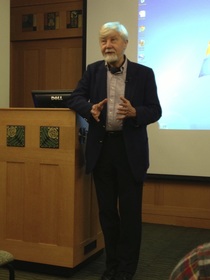
UCDP was stated in the late 1970s at the Department of Peace and Conflict Research, Uppsala University, Sweden, with inspiration from the Correlates of War project at the University of Michigan. It is now a major resources on armed conflict, non-state conflicts, one-sided violence, peace agreements and preventive measures. Trends in armed conflicts are regularly presented in Journal of Peace Research and other data are found in SIPRI Yearbooks as well as in the annual States in Armed Conflict reports from the program. Also the Human Security Reports/Briefs have carried this informatoin. However, the main source is the UCDP own homepage. In this presentation, Professor Peter Wallensteen who started and directs the program, will demonstrate the resources that are available for systematic research on organized political conflict. The seminar focuses on the utility for research as well as for policy making.
As a preparation visit the website on www.ucdp.uu.se.
Peter Wallensteen, Senior Professor of Peace and Conflict Research, Uppsala, first Dag Hammarskjöld Chair, Uppsala University (1985–2012) and Richard G. Starmann, Sr. Research Professor of Peace Studies at the Kroc Institute, University of Notre Dame, Indiana, USA (since 2006). Apart from directing the Uppsala Conflict Data Program he served as the first Head of Department of the Uppsala Department of Peace and Conflict Research 1972-1999.His book Peace Research: Theory and Practice (Routledge, 2011) contains chapters spanning Wallensteen’s research interests. His Understanding Conflict Resolution (Sage, 3rd edition 2012) explains UCDP.
As a preparation visit the website on www.ucdp.uu.se.
Peter Wallensteen, Senior Professor of Peace and Conflict Research, Uppsala, first Dag Hammarskjöld Chair, Uppsala University (1985–2012) and Richard G. Starmann, Sr. Research Professor of Peace Studies at the Kroc Institute, University of Notre Dame, Indiana, USA (since 2006). Apart from directing the Uppsala Conflict Data Program he served as the first Head of Department of the Uppsala Department of Peace and Conflict Research 1972-1999.His book Peace Research: Theory and Practice (Routledge, 2011) contains chapters spanning Wallensteen’s research interests. His Understanding Conflict Resolution (Sage, 3rd edition 2012) explains UCDP.
From Everyday Resistance to Revolution: Revisiting Protest Politics in the Middle East with Wendy Pearlman (Northwestern) and Jillian Schwedler (CUNY)
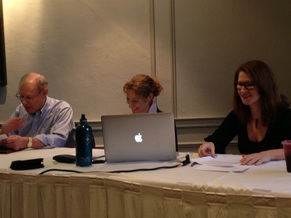
What distinguishes protest from other forms of political participation? How do individuals experience protest differently? How should the Arab uprisings reshape our understanding of the catalysts and effects of protest in the region? Wendy Pearlman will present her current work on participation in the Syrian uprising, based on over 150 interviews with displaced Syrians in Jordan and Turkey. Jillian Schwedler will present research conducted for her forthcoming book on protest in authoritarian settings, with a particular focus on Jordan from 1946 through the present.
This event was co-sponsored by the Workshop on Modern Middle East Studies (MoMES), the Center for Middle Eastern and North African Studies (CMENAS), and the Peace and Conflict Group in the Department of Political Science.
This event was co-sponsored by the Workshop on Modern Middle East Studies (MoMES), the Center for Middle Eastern and North African Studies (CMENAS), and the Peace and Conflict Group in the Department of Political Science.
CPRD Gatherings
In an effort to engage in some community building and acknowledge that it is as useful to interact outside of classroom as inside of it, the CPRD occasionally attempts to find some activity that embodies the spirit of the topic. Thus far we have had bowling and board game nights. We generally meet after the first session each month the workshop is underway.
Games & Gaming
- “The true object of all human life is play.” - G. K. Chesterton
- “Whoever wants to understand much must play much.” - Gottfried Benn
- “We are never more fully alive, more completely ourselves, or more deeply engrossed in anything than when we are playing.” - Charles Schaefer
- “Play is the beginning of knowledge.” - George Dorsey
- “We don’t stop playing because we grow old; we grow old because we stop playing.” - George Bernard Shaw
In the game the War on Terror, players have to develop their counter-terror capabilities or facilitate terror/terrorism within their own as well as surrounding nations. If one chooses to become part of the "axis of evil" however then they must don the balaclava (i.e., bal·a·cla·va). It all changes if oil is found.
Thus far, we have also played the board game Revolution. We have about 20 more to go.
Discontinued but Remembered
The Second Midwest Peace and Conflict Group Conference (2020)
Thursday: Short Course: Latent Variable Models with R and STAN, 3:30-6:00pm
Institute for Social Research, Room 1430
Dr. Chris Fariss will be teaching a short course, Introduction to Latent Variable Models with R and STAN. This course will provide an introduction to latent variable models generally with a practical focus on implementing them in R using the rstan library. The course emphasizes the use of construct validity to assess new and existing measures in applied research. We will implement several latent variable model examples together during the 2.5 hour workshop. Students are encouraged to familiarize themselves with the RSTAN website: http://mc-stan.org/rstan/. Participants should come with R, Rstudio (optional), and the stan library pre-installed on their laptops.
Friday: Panels, 9am-5pm
Weiser Hall, 10th Floor
Panel I: Coercion & Repression, 9:00-10:30am
This conference is sponsored by the University of Michigan Department of Political Science, International Institute, International Policy Center, Center for Political Studies, Rackham Graduate School, and the College of LSA.
Institute for Social Research, Room 1430
Dr. Chris Fariss will be teaching a short course, Introduction to Latent Variable Models with R and STAN. This course will provide an introduction to latent variable models generally with a practical focus on implementing them in R using the rstan library. The course emphasizes the use of construct validity to assess new and existing measures in applied research. We will implement several latent variable model examples together during the 2.5 hour workshop. Students are encouraged to familiarize themselves with the RSTAN website: http://mc-stan.org/rstan/. Participants should come with R, Rstudio (optional), and the stan library pre-installed on their laptops.
Friday: Panels, 9am-5pm
Weiser Hall, 10th Floor
Panel I: Coercion & Repression, 9:00-10:30am
- Lora DiBlasi (Michigan State University): The Leader’s Toolkit: How Leaders Choose their Tools of Repression
- Sasha de Vogel (University of Michigan): Information, Concessions and Reneging in Authoritarian Regimes
- Gregory Smith (Ohio State University): Power Today is Not Power Tomorrow: Adaptation and the Declining Effectiveness of Coercion
- Ingrid Vik Bakken (Norwegian University of Science & Technology): Sexualized Repression and Women’s Political Organization
- Cem Emrence (University of Michigan): When do Denunciations Feed Selective Violence in Civil War: The Role of Ideology
- Kathleen Gergely (Indiana University): Why Chechnya: Chechen Independence in Comparative Perspective
- Victoria Gurevich (Ohio State University): Returning Female Foreign Fighters: Motivational and Experiential Differences of the Women of ISIL
- Caleb Lucas (Michigan State University): Media Matters: Civilian Attitude Formation During Conflict
- Tom O’Mealia (University of Michigan): Local Trust in UN Peacekeeping: Survey Evidence from DR Congo
- Noah Schouela (University of Chicago): Criminal-Civilian Relations in the Mexican Drug War
- Corina Simonelli (University of Michigan): Targeted Sanctions and Rebel Behaviors in Civil Wars
- Natán Skigin (University of Notre Dame): The Unintended Consequences of Democratic Reforms: Electronic Voting and Criminal Violence in Brazil
- Kristin Foringer (University of Michigan): Negotiating the Boundaries of Post-Conflict Victimhood: The Political Construction of a Victim Category in Colombia's Victims' Law of 2011
- Helal Khan (University of Notre Dame): Conflict Analysis at a Migration Environment: From Group Discords to Violence in the Structure
- Anil Menon (University of Michigan): Warring Memories: The Political Behavior Legacies of World War II in Germany Rebecca Savelsberg (University of Michigan): Overcoming the Shadow of Violence: Narratives of Perpetration and Temporal Variation in Violence against Refugees
This conference is sponsored by the University of Michigan Department of Political Science, International Institute, International Policy Center, Center for Political Studies, Rackham Graduate School, and the College of LSA.
The 1st Midwest Peace and Conflict Group conference (2019)
This year was the first annual meeting of the Midwest Peace and Conflict Group held at Michigan State University. Attending institutions included Michigan State University, the University of Chicago, the University of Indiana, the University of Michigan and the University of Notre Dame.
Thursday, February 7, 2019
Friday, February 8, 2019
- 4:15-5:45 pm: Short Course A226 Wells Hall (619 Red Cedar Road, East Lansing, MI) “Using Latent Variable Models to Estimate the Prevalence of Sexual Violence in Armed Conflict” Jule Krüger (University of Michigan)
- 6:30-9:00 pm: Dinner (in Brewers Meeting Room) Lansing Brewing Company 518 E. Shiawassee Street Lansing, MI Keynote Address: Christian Davenport (University of Michigan)
Friday, February 8, 2019
- 8:15-8:45 am: Breakfast & Welcome Henry Center Commons (You’re welcome to come earlier since breakfast will begin at 7:30 in HC Commons)
- 8:45-10:15 am: Session 1 - Repression Henry Center Room B119
- Kiela Crabtree (University of Michigan) “How the South was Cleansed: Racial Violence, Black Out-Migration, and the Making of AllWhite Communities”
- Lora DiBlasi (Michigan State University) “Who Me?: How and When Pro-Government Militias Can Make Repression Less Expensive for Leaders”
- Lucía Tiscornia (University of Notre Dame) “Security Sector Reform and its Consequences: Police Militarization and Violence in the Aftermath of Armed Conflict”
- Nate Smith (Michigan State University) “The Conditional Relationship of Youth Bulges and State Repression”
- 10:15-10:30 am: Break
- 10:30 am-12:00 pm: Session 2 - Political Violence I Henry Center Room B119
- Genevieve Bates (University of Chicago) "Guerrillas to Government: Rebel-Party Transitions and Electoral Success in Colombia" (with Andres Uribe)
- Wynand Kastart (University of Indiana) "Regime Legacies and the Adversaries of Democracy: Evidence from Latin America"
- Jane Kitaevich (Univerity of Michigan) “A Boost or a Bane: Dynamics of Political Economy and State Accountability in States with Ongoing Militarized Conflicts”
- Megan Ryan (University of Michigan) “Last Line of Defense? Strategic Violence During Periods of Political Liberalization”
- 12:00-1:00 pm: Lunch Henry Center Atrium
- 1:15-2:45 pm: Session 3 - Political Violence II Henry Center Room B119
- Caleb Lucas (Michigan State University) “Deadly Dates: The Effect of Holy Days on Terrorism”
- Roya Talibova (University of Michigan) “They Hate Our Freedom? A New Global Dataset on Terrorist Group Motives” (with Carly Wayne)
- Camilo Nieto-Matiz (University of Notre Dame) “Integrating Subnational Peripheries: Violent Actors and State-Building in Colombia”
- Andres Uribe (University of Chicago) “Democracy, Opposition, and Alienation in the Colombian Civil War”
- 2:45-3:00 pm: Break
- 3:00-4:30 pm: Session 4 - Foreign Policy Henry Center Room B119
- Zuhaib Mahmood (Michigan State University) "Babbling or Communication? Communicating Foreign Policy Interests via Statements of Opinion at the United Nations General Assembly”
- Nadiya Kostyuk (University of Michigan) “Can States Make Cyber Deterrence Work?”
- Sabreena Croteau (University of Chicago) “Security in a Global Economy: Military Alliances within Trade Communities”
- 4:30-5:00 pm: Break
- 5:00-6:00 pm: Reception Henry Center Ballroom
- 6:00 pm: Dinner Henry Center Ballroom
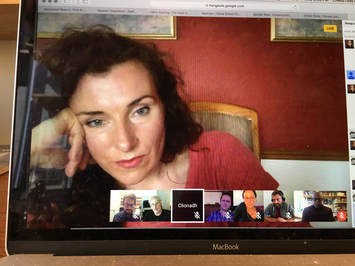
Conflict Consortium Virtual Workshop (CCVM). Following Charles Tilly’s Rules of Etiquette
Within this workshop (held virtually on Google Hangout), original research is put forward, comments are made and then a discussion ensues for an hour and a half regarding theory, hypotheses, method, analyses, findings are writing.
Schedule:
2013-2017
Within this workshop (held virtually on Google Hangout), original research is put forward, comments are made and then a discussion ensues for an hour and a half regarding theory, hypotheses, method, analyses, findings are writing.
Schedule:
2013-2017
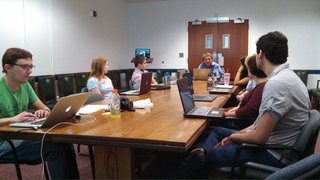
The Citizen Media Evidence Partnership (C-MEP)
The C-MEP is a pilot project for filtering and processing human rights related citizen videos for Amnesty International but independently from them. After providing a basic training in video validation and International Humanitarian Law to participating students and/or faculty, CMEP engages in a three-step process for participants to follow. Videos should be systematically collected and catalogued in a database, with use of a general database.
CMEP chapters were operational at the University of Michigan, Florida State and the University of North Texas. This project has now been suspended due to a lack of funds and consistent student interest.
The C-MEP is a pilot project for filtering and processing human rights related citizen videos for Amnesty International but independently from them. After providing a basic training in video validation and International Humanitarian Law to participating students and/or faculty, CMEP engages in a three-step process for participants to follow. Videos should be systematically collected and catalogued in a database, with use of a general database.
- Collection/Filtering/Cataloging of relevant videos
- Contextualization or validation of videos
- Processing (for internal documentation or publication)
CMEP chapters were operational at the University of Michigan, Florida State and the University of North Texas. This project has now been suspended due to a lack of funds and consistent student interest.
